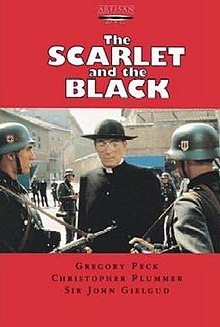The Scarlet and the Black
| The Scarlet and the Black | |
|---|---|
 |
|
| Directed by | Jerry London |
| Produced by | Bill McCutchen |
| Written by | J.P. Gallagher (novel) |
| Screenplay by | David Butler |
| Based on | The Scarlet Pimpernel of the Vatican |
| Starring |
Gregory Peck Christopher Plummer John Gielgud Barbara Bouchet Fabiana Udenio |
| Music by | Ennio Morricone |
| Cinematography | Giuseppe Rotunno |
| Edited by | Benjamin A. Weissman |
|
Production
company |
|
| Distributed by | Columbia Broadcasting System |
|
Release date
|
February 2, 1983 |
|
Running time
|
143 min. |
| Language | English |
The Scarlet and the Black is a 1983 television film starring Gregory Peck and Christopher Plummer. The production should not be confused with the 1993 British television miniseries Scarlet and Black, which starred Ewan McGregor and Rachel Weisz.
Based on J. P. Gallagher's book The Scarlet Pimpernel of the Vatican (published in 1967), the film tells the story of Monsignor Hugh O'Flaherty, a real life Irish-born Roman Catholic priest who saved thousands of Jews and escaped Allied POWs in Rome. It was directed by Jerry London.
The title The Scarlet and the Black is a reference not only to the black cassock and scarlet sash worn by Monsignores and bishops in the Roman Catholic Church, but also to the dominant colors of Nazi Party regalia.
In 1943, the Nazi military occupies Rome. Pope Pius XII (John Gielgud) is approached by General Max Helm and SS Head of Police for Rome Lieutenant Colonel Herbert Kappler (Christopher Plummer). The Colonel expresses concern that escaped Allied prisoners may attempt to seek refuge in the Vatican, and requests permission to paint a white line across St. Peter's Square in order to mark the extent of Vatican sovereignty. The Pope grants his permission, but when the SS officers leave, he sees out of the window that the white line had already begun to be painted.
Kappler's main antagonist is Monsignor O'Flaherty (Gregory Peck), an Irish-born Vatican priest who runs an underground organization which provides safe haven and escape to escaped POWs, Jews, and refugees in Rome. O'Flaherty is assisted in this enterprise by others, including locals, clergy and the diplomatic corps. The Nazis attempt to destroy the group, but Kappler is frustrated by O'Flaherty's successes, due to his cleverness, disguises, and stressing the limits of the Vatican's neutrality.
...
Wikipedia
